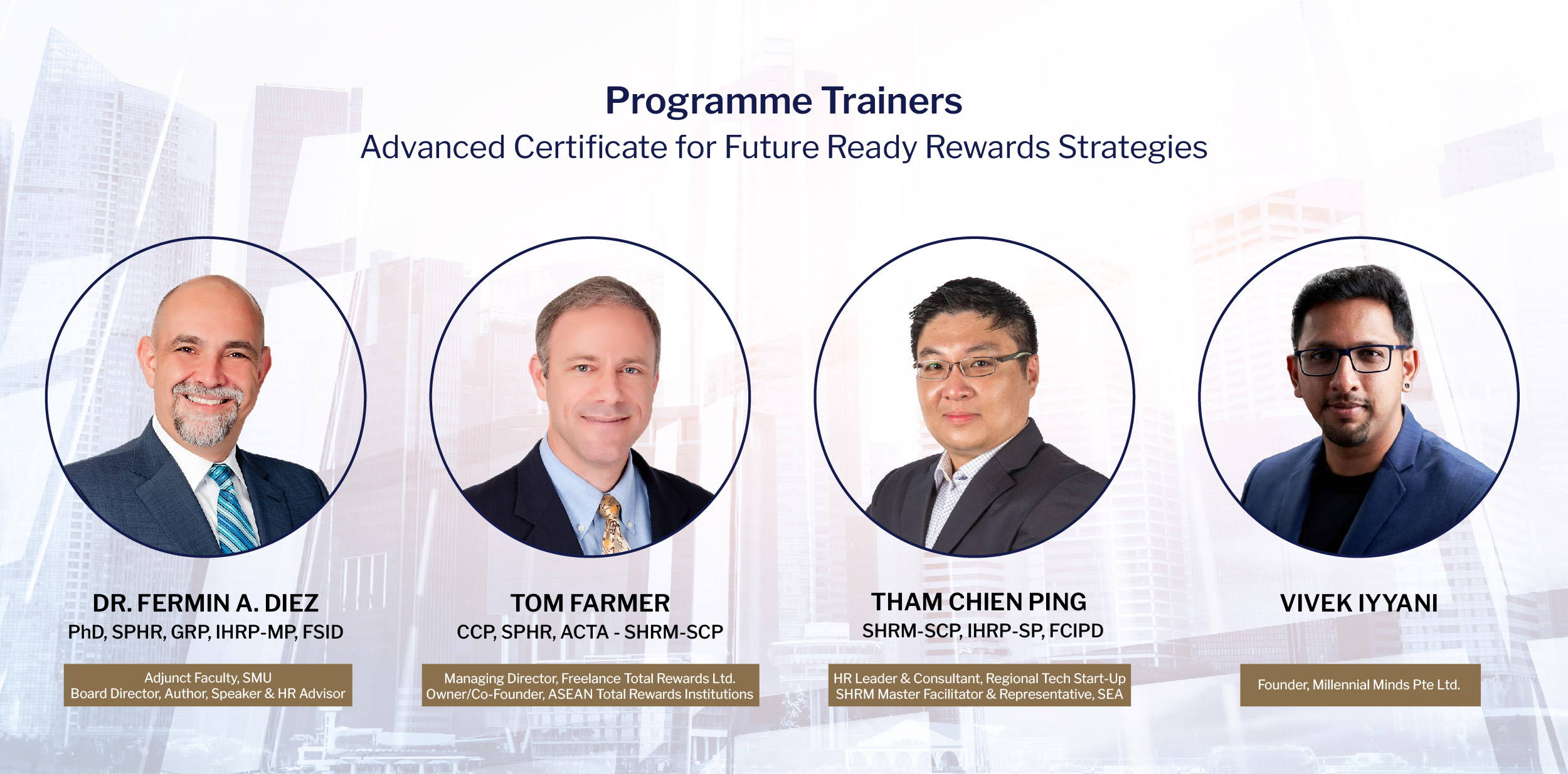
The Latest and Greatest
We have a knack for keeping up with the latest trends. We'll read up on them, but often end up finding reasons why we shouldn't just jump on the bandwagon.
- "Bitcoin! .. The new currency of payment!"
- "The Great Resignation! .. Retention bonuses!!"
- "Work from home!... It won’t work for most jobs."
- "Pandemic!... Work from home actually does work for most jobs."
- "Gig economy... Fixed-term contracts for core work, really?"
- "AI is here! ChatGPT solves all of our problems!"
Let's be honest: We win some, we lose some. We tend to play it safe, aiming not to lose rather than going all out to win, because the stakes feel too high. Meanwhile, our R&D and engineers are out there taking calculated risks, pushing the business to grow and strengthen. HR, on the other hand, prefers to stick to the tried and true, valuing consistency and fairness.
We attend seminars, conferences and read articles to stay up-to-date. Then go back to our time-tested work of benchmarking, job evaluations, job descriptions, reviews, talking points, and so on. Some of us get promoted for doing these things well, and that’s fine, that’s ok. But is it good enough to be future-ready?
"No one ever got in trouble for doing what everyone else does."
Pardon me, but we are not very good at being future-ready because we think it means keeping up with the latest trends. We spend 1% of our time exploring new and crazy ideas, we then look at our current practices and say “If it ain’t broken, don’t fix it” and we continue spending 99% of our time on the same old tools and processes. We find comfort in sticking to traditional practices because they are considered the industry standard, the norm, and the most prevalent—basically, they're what everyone else is doing. HR consulting firms say it’s best practice, and we’ve always done it. So we stick with it. Salary budgets? If the big salary survey firms say merit budgets will be 5.0%, we will budget 5.0%.
We stick to the middle of the road practices. Avoid extremes. Don’t be wrong. Play not to lose. After all, no one ever got in trouble for doing what everyone else did.
What Is Future-Ready?
Future-ready is playing to win. It’s a mindset rooted in humility and the possibility that the norm may not be the best. What we are trying out may not work, but we will learn something anyway. It's about staying vigilant and worrying that we might be missing out on important things we should be considering.
Future-Ready is the habit of questioning our assumptions, understanding the assumptions that underpin those assumptions, and being open to the possibility that one or more assumptions may be wrong, or perhaps only applicable to some of the cases. Future-ready means looking at the outliers, the exceptions to policy, making observations, and forming hypotheses. It's about analysing and visualising data to gain insights that can lead to action. Then, it's about adapting or developing new systems and policies to cater to areas where our traditional methods fall short.
Case Study: No Ratings
For instance, there was a time when performance ratings were the norm. But in 2012, Adobe shook things up by ditching them, sparking a trend. Soon after, big names like Google, Microsoft, Juniper, Accenture, Deloitte, and many other mostly tech-oriented companies, followed suit.
Why did companies ditch ratings?
- Intense competition for scarcely high ratings killed teamwork, despite teamwork mantras.
- They were seen as part of the pay system, and not mainly about development.
- Belief that forms, deadlines, and conversations people and managers hate don’t create value.
- Millennials wanted development opportunities and environments where smart risks were okay.
- The new generation of talent did not want to be stuck in a job description silo.
- Startup cultures emphasised breadth as well as depth, humility, curiosity, and bold bets.
- Desire to upskill managers by having frequent performance and development conversations.
Previously, the "best practice" was believed to be setting SMART goals (KPIs), conducting mid-year reviews, assigning manager ratings based on "expectations" (which often didn't align with SMART goals), holding calibration meetings, following a bell curve, and having just one formal development conversation. There was an assumption that ratings should, whenever possible, be tied to pay. It was also thought that the best processes needed to be managed and operated by HR, supported by the right performance management software. Additionally, there was an underlying belief that managers would not succeed without this structured support.
Do we still consider—or have we forgotten—the learnings from the no-ratings phenomenon? Future-ready means we learn from everything and can explain why we do what we do and why we don’t do what we don’t do. We hard-wire our learning through ongoing consideration and using data to measure effectiveness, and we change our practices when we one day find we are in the same situation as the firms that dropped ratings, or that our current practices are not effective. We keep an open mind and measure what matters, correlating effectiveness to workforce segments, old and new practices, etc.
This is a winning mindset. We’re not saying we should be the first adopters. We should be right-strategy-in-the-right situation adopters. We need to know our assumptions and our alternatives, at all times.
How We Got Here
In the past, we relied on traditional tools like job descriptions, merit reviews, and standard bonuses, benefits, and policies to maintain consistency and fairness. These methods were thought to work for nearly everyone, except maybe the C-suite and sales team. And, well, there were those eight long-term contractors in Engineering who weren’t on our payroll.
So we had a "correct" way of handling rewards, but with some exceptions. Oh, and we can't overlook the remote workers—though that’s more about the hybrid work policy. Except, of course, for that one person from the Philippines who still receives a Singapore-based salary and bonus post-pandemic. But aside from these cases, we were supposed to ensure a uniform approach for everyone else, right?
Well, let’s talk about people who:
- Are willing to exchange a bonus for a higher base salary.
- Negotiate the freedom to do a non-competitive side hustle.
- Negotiate the job description, or want more breadth to their role.
- Don’t want to be promoted, but want to keep growing.
- Prefer not to work as a full-time employee but are motivated even if they don’t have a bonus.
- Want to be positively motivated and not be forced to do something because they have to.
- Be supported in achieving their career aspirations, and not just monetary awards.
"A future-ready mindset sees nothing as an exception, but as a category one has already been through and is ready for."
And what about new incubator units within a large legacy corporation that want the freedom to implement their own performance and reward practices? They prefer not to use the company's established systems but instead adopt the approaches common in startups.
We are unprepared. Our “expertise” in the old, tried ways is precisely what got us to a state of unpreparedness. We are now in a new territory where the exceptions are highly diverse and increasingly prevalent. We can no longer look at non-traditional situations as exceptions. A future-ready mindset sees nothing as an exception, but as a category one has already thought about and is ready for.
How We Get Out
We need to equip ourselves with new ideas, new muscles, new approaches, and new tools. We need to be equipped to develop future-ready reward strategies.
It starts with self-awareness that we are in a comfort zone, doing HR the way it’s been done for 50 years. The new mindset will develop as we systematically look at our people and the new millennial and Gen Z attitudes about work, and rewards. It will develop as we look at and measure our reward and performance practices, identify underlying assumptions, identify the alternatives to these assumptions, alternatives to our practices, and think them through.
Understanding the psychology behind motivating employees is crucial for fostering a work environment that promotes sustained productivity and job satisfaction. It enables organisations to implement strategies that resonate with employees' intrinsic motivations and values, leading to enhanced performance, engagement, and loyalty, while also supporting their well-being and professional growth through positive and supportive actions taken by their managers.
Future-ready rewards are more than new tech. It is a mindset and a skillset that anticipates new realities regarding work and workers, and the ability to recommend and defend your reward practices on the basis of data-backed insight, analysis of alternatives, case studies, and pilot testing. A strategy is not simply “what you do” with your rewards. But what you do and why. And the why cannot be following the herd (benchmarking), following history (we’ve always done it this way), or following hearsay (Google does it; it must be best practice).
One Last Thought
Future-ready thinking makes HR work way more fun. Let’s stir the pot a little, make some waves, and do something a little different. Ready to shake things up and play to win? Jump into the Advanced Certificate for Future Ready Rewards Strategies at SMU Academy. Dive deep into the world of innovative reward systems, question the norms, and embrace the startup mindset. It’s time to move beyond the traditional, to analyse, adapt, and excel. Get the skills to be not just trend-aware but trend-setting. Don't just follow the herd; lead it with insight and data. Apply now and be the changemaker in HR!
This article is contributed by Dr. Fermin Diez, Vivek Iyyani, Thomas Farmer, and Tham Chien Ping, trainers of the Advanced Certificate for Future Ready Rewards Strategies.

